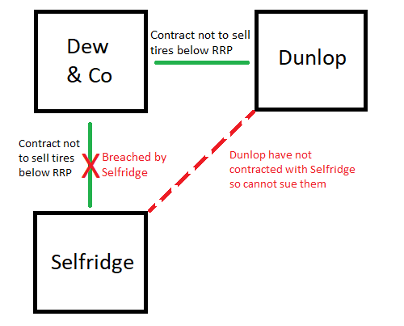Dunlop v Selfridge (1915) – Deflating third party claims
(Last updated: )

Dunlop Pneumatic Tyre Co. v Selfridge & Co. [1915] UKHL 1 ([1915] AC 847)
This case provided a statement of the fundamentals of privity of contract – no person can sue or be sued on a contract unless they are a party to it. Established in common law, this has been overturned by the Contracts (Rights of Third Parties) Act 1999, which allows third parties that are mentioned in, or benefit from, contracts, to enforce obligations within them (although the third parties themselves still cannot be liable).
Dunlop manufactured and sold tyres. They wished them to be resold at an agreed standard price (with a minimum threshold). They made an agreement on these terms with Dew & Co, their tyre dealer. Dunlop also wished retailers to adhere to the price minimum – so Dew & Co contracted with Selfridge on these terms, with a term stating that if the retailer sold below the list price, they would have to pay £5 per tyre to Dunlop. Selfridge sold below the agreed price, thereby breaching their contract with Dew & Co. Dunlop sued to enforce the contract between Dew & Co and Selfridge, and claimed damages. The House of Lords held that they could not do so – the doctrine of privity of contract ensured that only Dew & Co and Selfridge could sue each other over the specific contract in question, and no third party could enforce the obligations contained in it, even if they were set to gain from them.
Privity of contract ensures that third parties cannot have obligations placed upon them by a contract that they are not party to. It means, however, that that third party cannot enforce that same contract (along with Tweddle v Atkinson [1861] 121 ER 762, where a contracting party reneged on an agreement to pay a sum to the third party, who could not sue to enforce the contract). This historic case law has been largely superseded by the Contracts (Rights of Third Parties) Act 1999.
C(RTP)A allows a third party to enforce contractual terms if they are specifically mentioned as being authorised to do so, or if the contract purports to benefit them (unless specifically barred from enforcing in such a situation). If this Act were in force in 1915, Dunlopwould have succeeded in their case, as the contract between Dew & Co and Selfridge was for the specific purpose of benefiting Dunlop. This case is now bad law, but is illustrative in demonstrating how courts will interpret the purpose and bounds of contracts.
